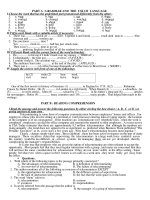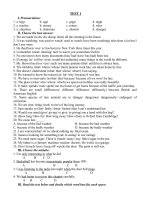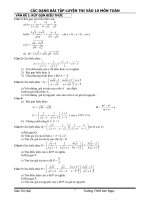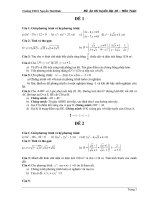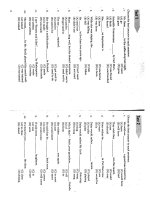Bài tập ôn tuyển sinh 10
Bạn đang xem bản rút gọn của tài liệu. Xem và tải ngay bản đầy đủ của tài liệu tại đây (176.13 KB, 18 trang )
TEST 1
I. Pronunciation:
1. a. heat b. seat c. great d. meat
2. a. teacher b. money c. return d. ruler
3. a. churches b. chairman c. chemist d. changes
II. Choose the best answer:
1. We are made (to do/ do/ doing/ done) all the cleaning in the house.
2. I (was watching/ was used to watch/ used to watch/ have been watching) television a lot but I
don’t any more.
3. He (had been/ was/ is/ has been) to New York three times this year.
4. I remember (meet/ meeting/ met/ to meet) you somewhere before.
5. No one knows how many documents (has/ had/ have/ has had) been lost.
6. If energy (is/ will be/ were/ would be) unlimited, many things in the world be different.
7. Mr. Brown has (too/ very/ such/ so) many patients (that/ until) he is always busy.
8. The children, (that/ whom/ whose/ their) parents work late, are taken home by bus.
9. She doesn’t understand (what/ that/ whose/ where) I am saying.
10. He wanted to know the reason (as/ for/ why/ because) I was late.
11. We have to start early (so that/ that/ because/ because of) we won’t be late.
12. The place (what/ who/ where/ which) we spent our holiday was really beautiful.
13. It (take/ spends/ took/ spent) me two hours to get home because of the traffic jam yesterday.
14. There are small (differences/ different/ difference/ differently) between British and American
English.
15. Some species of rare animals are in (danger/ dangerous/ dangerously/ endanger) of extinction.
16. We are (tire/ tiring/ tired/ to tire) of the long journey.
17. Sara speaks so (fast/ fastly/ faster/ fastest) that I can’t understand her.
18. Would you mind (give/ giving/ to give/ to giving) me a hand with this bag?
19. (How long/ How far/ How long away/ How often) is Oxford from Cambridge?
20. We came late _____.
A, because of the bad weather B. because the bad weather
C. because of the badly weather D. because the badly weather
21. I am worried (that/ of/ to/ about) talking my final exam.
22. Susan is looking for something (eat/ to eating/ to eat/ eating).
23. We need more sugar. There is (much/ many/ any/ little) sugar in the pot.
24. My father is a (farmer/ machine/ teacher/ doctor). He works in a garage.
25. Don’t (touch/ leave/ keep off/ watch) the door. The paint is still wet.
III. Choose the mistake:
1. I’m only interesting in what he did.
A B C D
2. Basketball has become increasingly popular from 1891.
A B C D
3. I was listening to the radio last night when the door bell rings.
A B C D
4. We had better to review this chapter carefully.
A B C D
III. Read the text below and decide which word best fits each space:
The Korean education system basically consists of primary schools, (1) schools, high schools,
and colleges (2) universities, with graduate courses leading to Ph.D. degrees. (3) education is
compulsory for children age six (4) eleven. The basic primary school curriculum is generally
divided into eight (5): the Korean language, social studies, science, (6), ethics, physical education,
music and fine arts. Students in secondary schools are required to take a number (7) additional
subject, such as English, and can take electives, (8) as technical or vocational courses. Afterwards,
students can (9) between general education and vocational high schools (10) general, high school
tends to be strict, as college and university admission is very competitive.
1. a. second b. secondary c. among d. half
2. a. as b. or c. but d. so
3. a. Primary b. High c. College d. University
4. a. from b. for c. with d. to
5. a. subjects b. courses c. topics d. titles
6. a. mathematician b. mathematics c. mathematically d. mathematical
7. a. of b. with c. for d. to
8. a. so b. such c. like d. alike
9. a. choose b. test c. wish d. consist
10. a. On b. In c. Of d. For
IV. Read the text below and say whether the statements are T or F:
David Hempleman Adams is an explorer and adventurer. In April 1984, he walked through
northern Canada to the North Pole. He walked 400 kilometers in 22 days. He was 27 years old
when he did it. David was the first person to walk to but North Pole by himself. Other people
traveled to the North Pole before David but they had a sled and a dog team. David didn’t have a
dog team. David was a brave bear and the icy water didn’t kill him.
1. David was the first person to walk to the North Pole alone. _____
2. He was 27 years old when he traveled to the North Pole. _____
3. David traveled to the North Pole with a dog team. _____
4. He was killed by the bear. _____
--------------------------------------------------------------------------------------------------------------------
TEST 2
I. Pronounce:
1. a. look b. blood c. good d. foot
2. a. bill b. child c. wild d. mild
3. a. loudly b. without c. thousand d. brought
4. a. purpose b. postpone c. postcard d. product
5. a. accomplished b. secretary c. comfortable d. necessary
II. Choose the best answer:
1. All of us are waiting the man (who/ which/ whom/ whose) son was lost.
2. Ken asked Barbara (unless/ in case/ regarding/ whether) she would like to go to the cinema.
3. (If/ Because/ Since/ Although) the old man spoke very slowly and clearly, I couldn’t understand
him at all.
4. The girl ____ is our neighbor.
A. talks to the lady over there B. is talking to the lady over there
C. was talking to the lady over there D. talking to the lady over there
5. Her eyes were red and puffy (even if/ since/ because of/ despite) she had been crying a lot last
night.
6. My daughter often says that she won’t get married until she (is/ will be/ will have been/ has
been) 25 years old.
7. Don’t ask me anything about sports. I like (neither/ both/ not only/ either) football (nor/ and/ but
also/ or) tennis.
8. The old manager has just retired, so Jack takes (on/ out/ in/ up) his position.
9. Your last job was a bank manager, (isn’t/ doesn’t/ didn’t/ wasn’t) it?
10. Children will work hard if the lessons are (expressing/ inquiring/ disappointing/ interesting).
11. (As quickly as/ As far as/ As soon as/ As long as) Long has finished his work, he will go
home.
12. Life here is very (peace/ peacefully/ peaceful/ peacefulness).
13. It is raining outside, and Tom brought his umbrella with him (so as to/ in order/ so that/ in
order to) wouldn’t get wet.
14. (Having/ Because having/ Because hadn’t/ Having not) quarreled with her boyfriend
yesterday, she doesn’t want to answer his phone call.
15. I gave up the job, (because/ because of/ although/ despise) the attractive salary.
16. Everyone was asleep when the enemy (was attacking/ attacked/ had attacked/ attacking).
17. Jack can speak two languages. One is English. (Other/ The other/ Another/ Others) is
Vietnamese.
18. Dogs are good traveling companions. They will go (whichever/ wherever/ whatever/
whenever) you take them.
19. He keeps working (although/ because of/ in spite of/ unless) feeling unwell.
20. He talked as if he (knew/ had known/ would know/ were knowing) where she was.
21. Please don’t be so (reason/ reasonable/ unreasonable/ reasonably) I can’t do all the work by
myself
22. Lomonosov was not (hardly/ fairly/ merely/ scarcely) a great scientist but also a very talented
poet.
23. My father asked me (what do you think/ what I think/ what did you think/ what I thought) of
the film.
24. Mr. Gibbon usually drinks mineral water, but in this party he (drinks/ will drink/ has drunk/ is
drinking) champagne.
25. The manager did not offer her job because of her untidy (sight/ view/ presence/ appearance).
III. Identify the one underlined word or phrase that must be changed in order to make the
sentence correct:
1. Every discount store advertises that their products are cheaper than its competitors’.
A B C D
2. The phone rung while I was washing the dishes.
A B C D
3. HCM City, that has the biggest population, is also the largest city in my country.
A B C D
4. I will intend to go back home when I finish my education.
A B C D
5. Henry’s friends told themselves to put his coat on the rack in their hall.
A B C D
IV. Read the text below and decide which word best fits each space:
Most people think of computers as very modern inventions, products of our new technological
age. But actually the idea for a computer had been worked out over two centuries ago by a man (1)
Charles Babbage. Babbage was born in 1971 and grew up to be a brilliant mathematician. He drew
up plans for several calculating machines which he called “engines”. But despite the fact that he
(2) building some of these, he never finished any of them. Over the years people have argued (3)
his machines would ever work. Recently, however, the Science Museum in London has finished
building (4) engine based on one of Babbage’s designs. (5) has taken six years to complete and
more than four thousand parts have been specially made. Whether it works or not, the machine
will be on show at a special exhibition in the Science Museum to remind people of Babbage’s
work.
1. a. called b. known c. written d. recognized
2. a. wanted b. made c. started d. missed
3. a. why b. whether c. though d. until
4. a. an b. that c. the d. some
5. a. One b. They c. It d. He
V. Read the text below and say whether the statements are T or F:
TELEVISION
Here in Egypt, television has a powerful hold on over people’s minds. It is an instrument of
leisure, of information and - of culture. It does not stop people reading newspapers or books, going
to the cinema or theater or watching videos. But these activities are occasional, irregular and
ultimately of secondary importance. Television is one of the main subjects of conversation, at
school, in offices, at home and in the street, as well as being written about in all the newspapers. It
might be said that the main objective of television is to persuade the maximum number of people
to watch it for the maximum amount of time. And how effectively the sitcoms and soap operas do
that! I do not think tat I have ever seen any other country so totally dominated by these shows.
Some of them are Egyptian productions but the majority is American. Each episode, each
programme, is a talking point for everyone, young and old alike.
1. Television, the rest of the media and American soaps. _____
2. At school or in offices, television is considered as a topic for entertainment. _____
3. The main objective of television is to allow much time for many people to watch it. _____
4. The sitcoms and soap are usually operas shown on TV. _____
--------------------------------------------------------------------------------------------------------------------
TEST 3
I. Pronounce:
1. a. circle b. brick c. fit d. fish
2. a. book b. floor c. cook d. hook
3. a. hear b. clear c. dear d. wear
4. a. suggest b. report c. profit d. career
5. a. attend b. public c. damage d. practice
II. Choose the best answer:
1. Kate is going to the United States for her holiday. She (save/ saves/ is saving/ has been) up for
nearly a year now.
2. The doctor advised me (smoke/ not smoking/ not to smoke/ not to smoking).
3. “Will you come to the party tomorrow?” “I will if I (have/ will have/ had/ am having) no
visitors.”
4. Do you know the boy (that/ whom/ whose/ which) father is a teacher.
5. He (was studying/ studied/ had been studying/ had studied) the effects of radiation when he
suddenly died.
6. I think he (will/ should/ could/ had) better not encourage the students to take extra lessons.
7. Dr. Sales is person (whom/ in whom/ in that/ that) I don’t have much confidence.
8. He thought much of his childhood (that/ where/ when/ which) he lived with his family n the
country.
9. His grandfather died (in/ of/ on/ at) the age of 90.
10. He always (avoids to meet me/ avoiding to meet me/ avoids meeting me/ to avoid meeting
me).
11. There was a lot of traffic _____.
A. and we go to the airport on time B. but we managed to get to the airport in time
C. because we had to get to the airport on time D. so that we could get to the airport in time
12. Let’s go out for a walk, (do we/ don’t we/ won’t we/ shall we)?
13. I was learning maths when my mother (comes/ came/ has come/ is coming) back.
14. “Who sings best in your school?” “Jerry (sings/ is/ has/ does).”
15. Several (chemists/ chemistry/ chemical/ chemicals) are known to cause cancer to develop
16. Please ask them (don’t smoke/ not smoking/ to not smoke/ not to smoke) in this area.
17. The boy (which/ who/ whose/ whom) is standing there is my son.
18. Television (is/ was/ has been/ had been) very popular since the 1950s.
19. Drinking and smoking will do great harm (to/ for/ with/ in) people’s health.
20. It is the largest ship I (had been/ saw/ have ever seen/ see).
21. Everybody in both cars (is/ are/ was/ were) injured in the accident last night.
22. (Do you like/ Would you like/ Will you like/ Have you like) to have lunch with us today?
23. We were disappointed that most of the guests (leave/ left/ have left/ had left) when we arrived
at the party.
24. Pupils are looking forwards to (go/ going/ went/ have gone) on holiday.
25. She hasn’t heard from her son (for several weeks/ for several weeks ago/ since several weeks/
since several weeks ago).
26. Gold (discovered/ was discovered/ has been discovered/ is discovered) near San Francisco in
1848, and the gold rush started the following year.
27. I’ll introduce to you the man (who/ whom/ that/ whose) support is necessary for your project.
28. All the guests got dressed in (nation/ national/ nationally/ nationalize) costume.
29. The more he tired to explain the (most/ much/ more/ many) confused we got.
III. Choose the mistake:
1. I used to getting up late when I was small.
A B C D
2. I haven’t got any money left. If I had money, I will buy a car.
A B C D
3. She left her house in a hurry without to say goodbye to us.
A B C D
4. This is the place which I was born and grew up.
A B C D
. She isn’t old enough to done this job.
A B C D
IV. Read the text below and decide which word best fits each space:
FRIENDS
To many people, their friends are the most important in their life. Really good friends always
(1) joys and sorrows with you and never turn their backs on you. Your best friend may be
someone you have known all your life or someone you have grown (2) with. There are all sorts of
things that can (3) about this special relationship. It may be the result of enjoying the same
activities and sharing experiences. Most of us have met someone that we have immediately felt
relaxed with as of we had known them for ages. However, it really takes you years to get to know
someone well (4) to consider your best friend. To the majority of us, this is someone we trust
completely and (5) understands us better than anyone else. It’s the person you can tell him or her
your most intimate secrets.
1. a. have b. give c. spend d. share
2. a. up b. in c. through d. on
3. a. bring b. cause c. provide d. result
4. a. enough b. too c. such d. so
5. a. who b. whose c. whom d. which
V. Read the text below and say whether the statements are T or F:
In the United States and Canada, it is very important to look a person in the eyes when you are
having a conversation with him or her. If you look down or to the side when the other person is
talking, that person will think that you are not interested in what he or she is saying. This is
course, is not polite. If you look down or to the side when you talking, you may appear hiding
something, that is, it might seem that you are not honest. However, people who are speaking will
sometimes look away for a few seconds when they are thinking or trying to find the right word.
But they always turn immediately back to look the listener in the eye. Those social rules are the
same for two women, two men, a woman and a man, or an adult and a child.
1. When you are talking to an American or Canadian, you should look to the side. _____
2. Looking down or to the side when you are spoken to means you feel bored with his or her
words _____
3. People can look away for a few seconds while speaking to hide something. _____
4. These social rules are user for everybody. _____
--------------------------------------------------------------------------------------------------------------------
TEST 4
I. Pronounce:
1. a. honesty b. harmful c. healthy d. hydrogen
2. a. appreciate b. conservation c. explanationd. gratefully
3. a. particular b. scholarshipc. earflap d. warmer
4. a. deafness b. release c. treatment d. conceal
5. a. genius b. goddess c. Google d. goodbye
6. a. custom b. conflict c. English d. gesture
7. a. honesty b. introduce c. property d. mineral
8. a. independence b. revolution c. associate d. operation
9. a. apprehension b. technology c. accessible d. miraculous
10. a. abnormality b. administrative c. preferentially d. educational
II. Choose the best answer:
1. In order to master a language, learners need to spend a great deal of time on (practice/
practicing/ to practice/ practiced) it.
2. It is (up on/ up to/ towards/ for) human beings to decide the future of the earth.
3. The World Health Organization is trying to play (down/ out/ up/ with) the ill effects of SARS
on Asian people.
4. The experts of WHO are carrying out many experiments (in order that/ in order to/ in order for/
in order as) they can find a treatment for cancer.
5. (Prevent/ To prevent/ Preventing/ Prevented) some species from becoming extinct, the
government has set up several throughout the country.
III. Use the correct forms of the word given:
1. A holiday in American can be (surprise) _______________ cheap.
2. After several (succeed) _______________ attempts, we have finally got it.
3. His busy work made him completely (access) _______________ to his relatives.
4. Clean air make us (health) _______________.
5. A few diseases are still (treat) _______________ in the world.
6. Skilled workers are (prefer) _______________ admitted.
IV. Reading comprehension:
RECEPTION AND AUDITION
The field of music cognition involves the study of many aspects of music including how it is
processed by listeners.
Music is experienced by (1) in a range of social settings ranging from being alone to attending a
large concert. Musical performances take different forms in different cultures and socioeconomic
milieus. In Europe and North America, there is often a divide between what types of music are (2)
as a “high culture” and “low culture”. “High culture” types of music typically include Western art
music such as Baroque, Classical, Romantic, and modern-era symphonies, concertos, and solo
works, and are typically heard in formal concerts in concert halls and (3), with the audience sitting
quietly in seats.
On the other hand, other types of music such as jazz, blues, soul, and country are often
performed in bars, nightclubs, and theaters, where the audience may be able to drink, dance, and (4)
themselves by cheering. Until the later 20
th
century, the distinction between “high” and “low”
musical forms was widely accepted as a valid distinction that (5) out better quality, more advanced
“art music” from the popular styles of music heard in bars and dance halls.
However, (6), musicologists studying this perceived divide between “high” and “low” musical
genres argued that this distinction is not based on the musical value or quality of the different types
of music. Rather, they argued that this distinction was based largely on the socioeconomic standing
or social class of the performers or audience (7).
(8), whereas the audiences for Classical symphony concerts typically have above-average
incomes, the audience for a hip-hop concert in an inner-city area may have below-average incomes.
Even though the performers, audience, or venue where non-“art” music is performed, such as blues,
hip-hop, punk, or ska may be very complex and sophisticated.
Deaf people can experience music by feeling the vibrations in their body, a process which can be
enhanced if the individual holds a resonant, hollow object. A well-known deaf musician is the
composer (9), who composed many famous works even after he had completely lost his hearing.
Recent examples of deaf musicians include Evelyn Glennie, a highly acclaimed percussionist who
has been deaf since the age of twelve, and Chris Buck, a virtuoso violinist (10).
1. a. individuals b. groups c. persons d. peoples
2. a. seen b. viewed c. watched d. looked
3. a. companies b. schools c. factories d. churches
4. a. describe b. cure c. treat d. express
